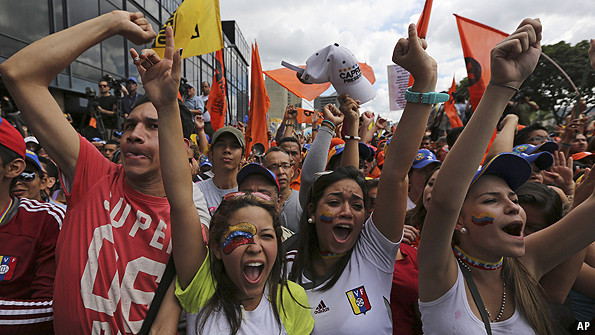Venezuela

Opposition leader Henrique Capriles, governor of Miranda state, and other spokespeople for the opposition Democratic Unity (MUD) alliance have called on their supporters to turn the vote into a plebiscite on the seven-month-old leftist government of Nicolás Maduro. Elected by a slim margin in April after his predecessor and mentor Hugo Chávez died of cancer, Mr Maduro is accused by the MUD of having stolen that election. The supreme court and the electoral authority (CNE)—both controlled by the regime—declined even to consider opposition complaints. This, then, is an opportunity to demonstrate that anti-chavista forces do indeed represent the majority.
Amid a sharp economic downturn, with inflation running at over 50%, growth anaemic and many basic goods missing from the shelves, Mr Maduro’s popularity was waning even among die-hard chavistas. But in a canny move a month ago, the president sent troops and civilian inspectors to impose sharp retail-price reductions on everything from washing machines to clothes. The ensuing spending spree, which may have bankrupted some businesses, is thought to have boosted his support, even if only temporarily, although polls have not had time to reflect it.
The carrot of cheap consumer goods has been accompanied by the stick of increasing repression. One high-profile opposition candidate was disqualified from running, two more are threatened with prosecution. In the western border state of Zulia, a candidate was murdered, although the circumstances remain murky. Attacks on journalists, both physical and judicial, are running at record levels, while the government stranglehold on nominally independent media organisations has been tightened. State media, meanwhile, churn out propaganda for official candidates and broadcast slurs on their opponents.
Henrique Capriles’s rallies have been attacked by government supporters and vehicles destroyed. Attempts have been made to prevent him from travelling and a poster campaign identifies him as one of a so-called "trilogy [sic] of evil" supposedly backed by Washington. The government has even decreed December 8th to be "Loyalty to Chávez Day", opening up the prospect of illegal political rallies in support of "the eternal leader". The CNE, whose tasks include ensuring a fair vote, says it is within its rights to do so.
The pro-government majority in parliament, which has already granted the president the power to rule by decree for the next twelve months, this week went a step further. It voted to convert the government’s political platform into law, thus—in theory at least—making it illegal to oppose moves to transform Venezuela into a socialist state. A special body is to be set up to manage states of emergency, which the government appears to envisage as a regular feature in the future.
The opposition is likely to make significant gains on Sunday, especially in the big cities. If it achieves a majority of the national vote, Mr Maduro’s position will be weakened. Failure, on the other hand, could have dire consequences for the opposition leadership. But whatever the result, it will do nothing to resolve the country’s economic and political crisis and could even contribute to deepening it by adding to the political deadlock. Since April, confidence in the CNE has slumped and the danger is that the electorate will abandon all hope of a solution via the ballot box. Venezuela is entering dangerous territory.
No comments:
Post a Comment